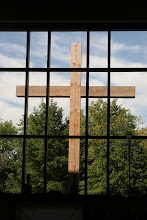Ash Wednesday Sermon
Pastor Carrie Scheller
Feb 25, 2009
Joel 2: 1-2, 12-17
Matthew 6: 1-15
Today is Ash Wednesday, a solemn day of prayer that begins the forty- day season of Lent. I’ve often heard Ash Wednesday being compared to the Jewish Day of Atonement, the day on the Jewish calendar set aside for people to acknowledge and confess their sins, and also to atone for them, and to reconcile themselves to God. A Jewish friend of mine once tried to explain the day to me, reminding me that it was not really a holiday, but a day to afflict the soul, to remind oneself of all of the sins committed during the past year, and to try to make things right with people and with God by offering reparation or apology. He warned me, “Never wish anyone ‘happy day of atonement.’
I don’t think we would ever wish anyone happy Ash Wednesday either. It’s on this day that Christians also make a special effort to remember and confess our sin. It’s the beginning of the season on our church calendar when we are invited to carry out the Lenten discipline, practices of fasting, prayer and works of love. It’s also on this day that we receive the sign of the cross, made with ashes, on our forehead. This ancient symbol of repentance reminds us of our mortality. Returning to God’s mercy and grace, marked with the cross of Christ, we make our way through Lent, longing for the baptismal waters of Easter, our spiritual rebirth. (ELW p 248)
This Lenten season our focus at Trinity will be on prayer, specifically the Lord’s Prayer. Each week, Pastor Kent and I will speak about the way that our lives and our faith are shaped by this very important prayer that Jesus taught us with the expectation that we pray it. A Lenten devotional will be posted on the Trinity website that will guide you through an aspect of the Lord’s Prayer each day during Lent. Together we will discover that this prayer contains many facets and nuances.
We’ve become very familiar with this special and wonderful prayer. It was probably one of the first things that you memorized in Sunday school. It might contain the comforting words that you turn to first when you are worried, or scared, or in danger of any kind. It’s the prayer that we all know. It doesn’t matter where I am, if I invite people to pray with me in the words that Jesus taught us, they know what I mean, and they know what to say.
This Lenten season and beyond, I invite you to start to ponder, as you pray the Lord’s Prayer, what it means to you, and for you, and for the rest of the world. Jesus didn’t give us this prayer so we had something easy to memorize and so we wouldn’t have to think in order to pray. As we pray and study the Lord’s Prayer, we will discover that it not only describes, but challenges our life together with each other, and with God.
In giving his disciples, and us, the gift of this prayer, Jesus wasn’t laying down the law or telling us what to do – Jesus was inviting us into relationship with God that would be challenging and comforting, and filled with grace. This relationship would judge us and empower us and save us. The more comfortable we become in this relationship by staying connected to God and trying to understand God’s love us and will for our lives, we will be delighted as we discover how far God’s forgiveness goes, far beyond our expectations. (French, p 12) All this will come simply by praying, and thinking about, and talking about the words that Jesus taught us.
The Lord’s Prayer is a prayer which is common to and connects all Christians. We are reminded at the very beginning of this prayer that when we pray, we are never alone. In our individualistic society, it’s easy to fall into the trap of thinking that my spirituality and my prayer is a private matter involving nobody but myself and God. (Bondi p 24)
The Lord’s Prayer reminds us that God is “OUR” Father, and sharing a parent makes us all a part of the same family. In a little book called “A Place to Pray: Reflections on the Lord’s Prayer,” scholar and theologian Roberta Bondi considers what this means for our lives. She writes, “My unity with other Christians, after all, isn’t something that I must make happen myself. Whether I want it or not, the fact is, whenever I speak the words ‘Our Father, give us this day our daily bread,’ by virtue of my baptism I am praying as part of the people of God, and in return, they are praying with me… ‘Our Father’ teaches us we have a place in the family of God to which we belong simply because we are human beings.” (Bondi p 27, 28)
Let us pray
Jesus, you taught us to pray. Now, please grant us the faith and courage not only to boldly pray in the words you taught us, but to follow you in the way of God. Amen.
references:
Bondi, Roberta C. A Place to Pray; Reflections on the Lord's Prayer Abingdon Press, 1998
Evangelical Lutheran Worship Augsburg Fortress, 2006
French, Henry F. book of faith Lenten Journey; 40 Days with the Lord's Prayer Augsburg Books, 2009
Wednesday, February 25, 2009
Subscribe to:
Post Comments (Atom)


No comments:
Post a Comment